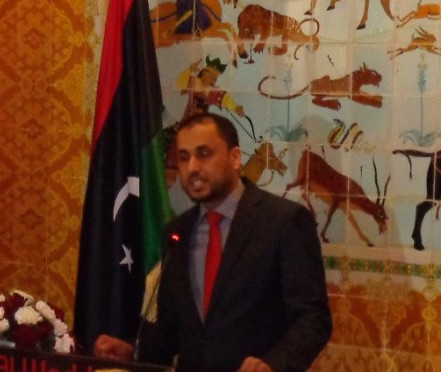By Libya Herald reporter.

Tripoli, 29 January 2015:
Following the announcement from UNSMIL that the political delegates to the dialogue process who met . . .[restrict]again in Geneva on Monday and Tuesday have agreed to transfer the talks to Libya, the reconstituted General National Congress has announced that it will now participate.
Ten days ago, Congress said it would join if the talks were held in Libya, suggesting the venue be Ghat, but three days later it announced it had withdrawn the offer, no matter where they took place, because of the attack on Benghazi the Central Bank of Benghazi.
In its statement today, the GNC said they would now be prepared to meet “in any Libyan city”.
However, there were a number of conditions which are likely to be rejected by many of the other political delegates as well as those from the municipalities, civil society, the military and others invited to participate by UNSMIL.
These conditions are:-
- Limiting the delegates to the talks;
- No dialogue with “wanted people”;
- Compliance with the Supreme Court ruling of 6 October, 2014; and
- Respect for the Constitutional Declaration.
Congress also indicated that it would not accept anything that had already been decided in Geneva because its representatives had not been there.
Deputy Congress President Saleh Makhzoum, at a press conference in Tripoli today explaining the decision, insisted on parity between both sides in the dialogue. Numbers should be limited to four from Congress and four from the House of Representatives. That was because the talks were political and only political delegates should participate, he said – rejecting the invitation of non-political figures (such as municipal and military representatives) to the process. He questioned how anyone could imagine that the latter could decide on a government of national unity.
The insistence of parity between the two sides is likely to see stiff resistance from the HoR and its supporters who consider that Congress in its present state as empowered and maintained by the guns of Libya Dawn whereas it was elected.
No dialogue with “wanted people” could also be a problem if it is widened out to include more than members of the Qaddafi regime.
Compliance with the Supreme Court ruling is more of a grey area. Congress and its supporters believe that the ruling annulled the June elections which created the House of Representatives and thus the HoR-appointed Thinni government, and that it was re-legitimised.
In fact the Supreme Court annulled Paragraph 11 of the Seventh Amendment to the Libyan Constitutional Declaration, passed by Congress on 11 March, 2014, which concerned itself with the HoR’s requirement to decide within 45 days from its first meeting“to settle the question of whether the temporary president is to be elected directly or indirectly.” It also annulled all subsequent effects.
There were very few. At most, it could affect the HoR decision to give itself presidential powers.
The HoR elections of last June were not governed by Paragraph 11. They were authorised by Congress’ Law No. 10/2014 which the Supreme Court did not rule on or annul.
That being the case, both the HoR and international may not find it difficult to accept that the Supreme Court ruling on the grounds that it changes very little and does not invalidate the HoR’s existence or legitimacy.
Respect for the Constitutional Declaration is not thought to pose any problems.
Although the political delegates have now agreed that future meetings should be in Libya, they have already shown that although they want compromise they are not prepared to be dictated to by Congress. After it said it would not go to Geneva and the talks had to be in Libya, Imhamed Shouaib, the deputy president of the House of Representatives, told the Libya Herald that the delegates wanted to meet in Libya but the location had to be secure. Meanwhile, though, they would go back to Geneva. The matter would be discussed there, he said. [/restrict]







